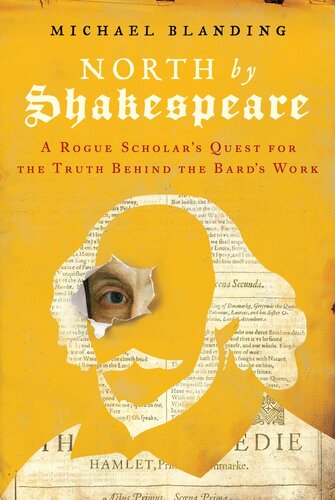
North by Shakespeare
A Rogue Scholar's Quest for the Truth Behind the Bard's Work
- اطلاعات
- نقد و بررسی
- دیدگاه کاربران
نقد و بررسی

January 25, 2021
Journalist Blanding (The Map Thief) sheds light on the origin of Shakespeare’s works in this lively account of independent scholar Dennis McCarthy, who believes the Bard’s plays were inspired by now lost works written by Elizabethan courtier Thomas North. McCarthy began studying Hamlet in 2005 out of personal curiosity. A college dropout in his mid-40s, Blanding writes, McCarthy soon became a self-educated Shakespeare expert, self-publishing a book of his findings in 2011. Much of the evidence for his theory comes from his work comparing Shakespeare’s texts to documents written by North using antiplagiarism software (such as his translations of Dial of Princes and the works of Plutarch), tracing their similarities to works including Hamlet and A Midsummer Night’s Dream. Also, North’s inside knowledge of a 1551 murder in Arden, specifically, points to plot points in Arden of Faversham, a play believed to be by Shakespeare. Much of the book is taken up with summarizing Elizabethan history to provide context for McCarthy’s theories, but Blanding does a good job of capturing the eccentric McCarthy and his passion to get to the bottom of this particular rabbit hole. Shakespeare fans and readers who enjoy the thrill of a good bibliographic treasure hunt will want to check this out.

February 5, 2021
In 2015, Blanding was invited to talk about his book, The Map Thief, at Lafayette College. Afterward, his hosts introduced him to an independent scholar, Dennis McCarthy, who claimed he'd found evidence that proved Shakespeare had borrowed plots for his own plays from the vanished plays of Thomas North (d. 1604), best known now for a translation of Plutarch's Lives. That experience inspired this book, as Blanding followed McCarthy in his attempt to convince skeptics of his ideas. Blanding recounts the odyssey of an iconoclast scholar seeking recognition in a world to which he doesn't quite belong. Even more, though, this book is a painstaking accounting of how McCarthy arrived at his conclusions. McCarthy finally had some success when in 2018 he co-authored a book on a newly uncovered manuscript by North's brother older George. Using plagiarism software, he uncovered common word strings in North's manuscript and the Bard's plays, including Macbeth. The question of Shakespeare's sources is one that can never fully be resolved, but Blanding believes that McCarthy's ideas deserve a wider audience than they've received so far. VERDICT Bardolators will want to read this book; for others, it's an optional read.--David Keymer, Cleveland
Copyright 2021 Library Journal, LLC Used with permission.

February 15, 2021
How Shakespearean was Shakespeare? In this investigative follow-up to The Map Thief (2014), journalist Blanding dives into the ongoing debates over the authorship of Shakespeare's plays with a lively profile of freelance writer Dennis McCarthy, who has mounted considerable evidence that Shakespeare drew heavily on the works of English translator, lawyer, diplomat, and writer Thomas North (1535-1604). The son of Edward North, a prominent courtier who rose in stature and wealth during the reigns of Henry VIII, his daughter Mary, and finally Elizabeth, Thomas kept a detailed journal during travels with his father and enjoyed a privileged view of aristocracy. With McCarthy, Blanding traced Thomas' footsteps in England, France, and Italy, research that informs his brisk recounting of North's life and turbulent times. Unlike some who claim that another person--Francis Bacon, perhaps, or Edward de Vere, the Earl of Oxford--was the real author of Shakespeare's plays; and unlike others who argue that Shakespeare likely collaborated with multiple co-writers, McCarthy told Blanding that "he believed the Bard of Avon wrote every word attributed to him during his lifetime." He also believed, however, that Shakespeare--who never traveled in Europe and had no connection to court life--needed to rely on sources. Even Mark Twain questioned how Shakespeare "mastered the nuances of a lawyer, a courtier, and a soldier" without experiencing those roles. While scholars agree that historical chronicles by Holinshed and Hall provided much material, McCarthy claims that Shakespeare lifted plots, characters, and even phrasing from North. Using plagiarism detection software and referring to the huge database Early English Books Online, McCarthy has concluded that correspondences between Shakespeare and North are indisputable. Not surprisingly, McCarthy's arguments have not been welcomed by Shakespearean scholars; too many, he asserts, are invested in the image of Shakespeare as a solitary genius. Readers who peruse his lengthy appendix, offering parallel excerpts from North and Shakespeare, can come to their own conclusions. An entertaining look at a literary iconoclast.
COPYRIGHT(2021) Kirkus Reviews, ALL RIGHTS RESERVED.

March 1, 2021
In Macbeth's metaphor of life as a speedily exhausted candle, Blanding sees more than Shakespeare's poetic imagination. He sees the unrecognized influence of Thomas North, a sixteenth-century soldier, courtier, attorney, and translator. North's influence on the Bard, Blanding acknowledges, came into his view through Dennis McCarthy, an uncredentialed but zealous scholar who has identified dozens of parallels between North's published works and Shakespeare's plays (including not only Macbeth but also Othello and Hamlet). McCarthy has even speculated that Shakespeare borrowed to the point of plagiarism from lost plays North supposedly wrote. Thus, North's life history becomes for McCarthy an explanation for features of Shakespeare's plays hard to explain as the work of a minimally educated playwright. McCarthy does not join those who have denied Shakespeare's authorship, typically attributing the Bard's works to Francis Bacon or Edward de Vere. However, Blanding interprets McCarthy's views as discernibly similar. Readers not persuaded by McCarthy's theory may still gain from his insights into how guardians of orthodoxy deal with an interloper.
COPYRIGHT(2021) Booklist, ALL RIGHTS RESERVED.




دیدگاه کاربران